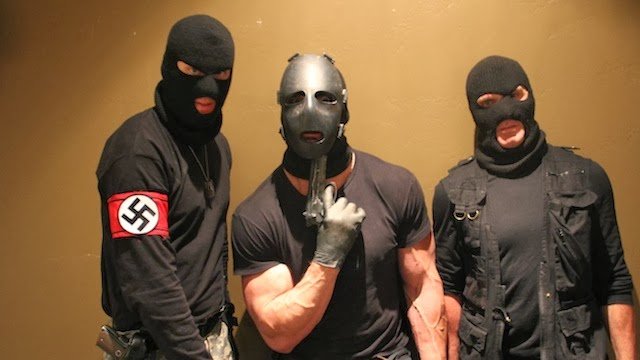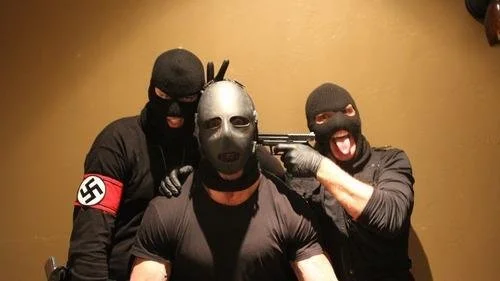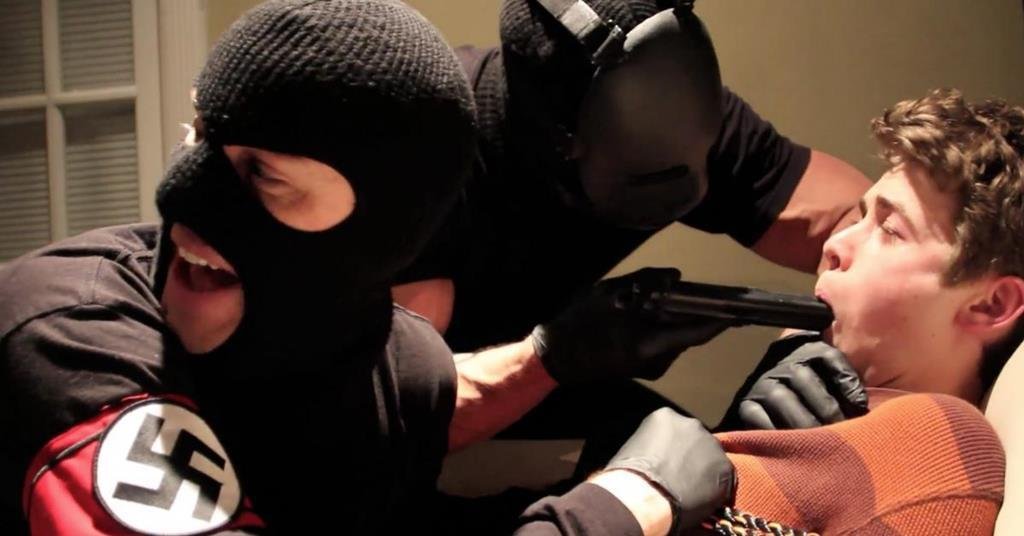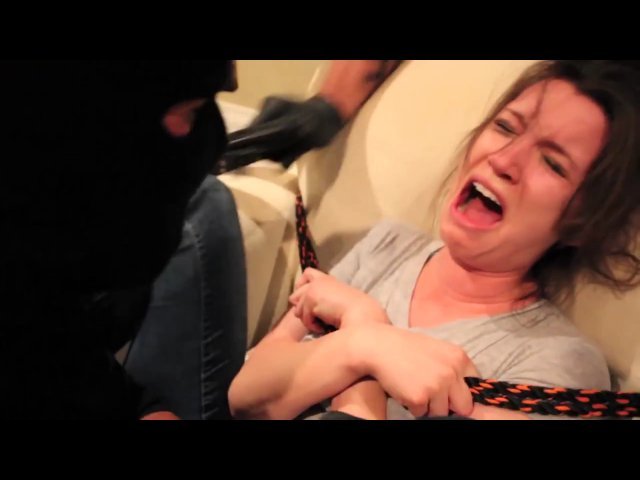[Film Review] Hate Crime (2012)
The last review I wrote was a little difficult to get started because of how complex the film was. This one is different: Hate Crime is difficult to review because I really want to focus on its positive strengths, but the more I think about the film the more they elude me. I know there are some in there, somewhere, but the film is so relentlessly nasty that its “good” qualities seem to retreat into the shadows. I’ll give it a go though.
Here’s the scenario: a family is sitting down for their youngest child’s birthday dinner, and recording it for posterity like every other birthday (even though the kids are tired of that tradition). Just before the cake comes out, three masked men break into the house and proceed to terrorise the family for the next hour, handing the video camera around between themselves for the sake of their own souvenir. The family are Jewish and the masked men Nazi sympathisers who want to scare them out of town; but the situation escalates rapidly into torture, humiliation and yes, worse.
I’ve seen enough films featuring bigots, bullies or similar that I kind of expect some revenge or comeuppance to be a satisfying direction for the plot. Hate Crime is not about satisfaction though: Hate Crime is about just that, the anti-Semitic violence. Writer James Cullen Bressack (who also directed, filmed, produced and edited the film) says he “wanted to tell a story to remind us that we live in a dangerous world; a world where racial violence is on the rise”. That’s a perfectly valid objective, but I strongly feel that his use of the found footage approach, effective though it may be, is way too blunt an instrument for a social message. I’ve covered other films which were written and screened to bring social issues to public attention (for example Article 15 and Zabawa, Zabawa), and their success lay in their patience: to be moved by a message, we need to feel for the people involved, we need to understand the message and we need to believe it. The audience has hardly any time to get to know the suburban victims in Hate Crime before the attacks happen; and although as the closing caption states “Hate and Prejudice still exists today” the bad guys are presented as too stupid and cartoonishly extreme to feel believable.
Let me take a look at the three thugs, known only as One, Two and Three during the home invasion. One (Jody Barton) tries to apply an occasional voice of reason to his little gang, but high on the rush of violence and meth, it doesn’t reach Two (Tim Moran) or Three (Ian Roberts) for very long. I’m not sure if they spent more time arguing with each other about what to do with the victims than actually doing any of it or if it just felt that way, but there was certainly enough shouting and arguing that the whole thing became surprisingly tedious quite quickly. It’s bizarre to describe a series of tortures as tedious, but it did feel as though they kept adding torments to their victims that I’d not come across before just to maintain my attention. That was certainly the case for the middle section of the film; but once a moment was reached when One became temporarily separated from Two and Three, the plot did develop a little more; primarily due to the latter pair’s sheer stupidity. And there lies another issue which took me right out of the film: it felt like Bressack sneered at his antagonists in his writing, rather than making them believable; and found footage truly has to look and feel authentic for it to work.
The actors portraying the Jewish family are a lot better, but not straight away. If I had stumbled across Hate Crime on a streaming service, I would have turned it off after ten minutes; not because of the violence (which was just starting at that stage), but the cast at this point didn’t seem to be bothering, but rather just waiting for the action to kick off. Once it did, though, they suddenly switched on. Interestingly, because the camera was in the hands of the Nazi gang from then on, we only saw the family members when the gang members took an interest, and only saw what interested or amused them. Nicholas Clark was a very scared older son, albeit fleetingly; Gregory DePetro was the father, humiliated until he became pathetic; Maggie Wagner spent most of the film tied down to a pool table but when her face showed, it truly looked like she’d been through it all. The one who impressed me the most though was Debbie Diesel as the teen Lindsay: the longest scene of the film featured just her and One, who (mostly) just looked at her; that face of a young woman who desperately wanted to stay strong but couldn’t see how, is one image that will stay with me from Hate Crime.
No doubt I’ve given the impression that there are other images I won’t be able to shake off too. Yes, this is indeed a brutal film, and it does contain multiple rape scenes and a huge amount of coarse and bigoted language; but most of the violence is ridiculously extreme, a la Ren and Stimpy, and not presented in a way that you can imagine the feel of it (like in, say, Becky). In actual fact, severe and cruel though it is, the vast majority of the violent acts are off camera. That’s not to deny that there is way more than enough to imagine taking place just beyond view, there is certainly one image I wish I’d never seen, and most of what takes place during the home invasion are the sort of crimes I don’t think 12-year-old Sloane Morgan Siegel (who played birthday boy Alex) should have been exposed to… but still, it’s not impossible to maintain perspective as a viewer: it’s “only a film” in which the rape victim’s underwear remains in place and tidy nearly all the way through.
Apart from the acting, the other quality which really worked was the home video style production: it genuinely looked and felt like Hate Crime was made in real time, especially in the last third or so of the film. As I mentioned earlier though, that found footage approach didn’t do the film any favours: as well as the haste that the film cannot avoid, it also brings an amateur form, such as in the sound quality. For a good deal of the film, it’s almost impossible to tell what the gang were yelling at each other: that’s not unrealistic, given the circumstances, but it’s pretty tiresome for an audience.
So in a nutshell, there are some great performances and some sound production in Hate Crime, although some poor writing, and I am of the opinion that the wrong approach was made for this film’s agenda. If you’re nevertheless still interested, it is now coming to home video viaTetroVideo in November in a limited Mediabook edition of 100 copies (a slipcase, DVD and 20-page booklet).








![[Editorial] 5 Slasher Short Horror Films](https://images.squarespace-cdn.com/content/v1/5fe76a518d20536a3fbd7246/1696358009946-N8MEV989O1PAHUYYMAWK/Screenshot+2023-10-03+at+19.33.19.png)
![[Ghouls Podcast] Maniac (2012) with Zoë Rose Smith and Iona Smith](https://images.squarespace-cdn.com/content/v1/5fe76a518d20536a3fbd7246/1696356006789-NYTG9N3IXCW9ZTIJPLX2/maniac.jpg)
![[Editorial] If Looks Could Kill: Tom Savini’s Practical Effects in Maniac (1980)](https://images.squarespace-cdn.com/content/v1/5fe76a518d20536a3fbd7246/1694952175495-WTKWRE3TYDARDJCJBO9V/Screenshot+2023-09-17+at+12.57.55.png)
![[Editorial] Deeper Cuts: 13 Non-Typical Slashers](https://images.squarespace-cdn.com/content/v1/5fe76a518d20536a3fbd7246/1694951568990-C37K3Z3TZ5SZFIF7GCGY/Curtains-1983-Lesleh-Donaldson.jpg)
![[Editorial] Editor’s Note: Making a slash back into September](https://images.squarespace-cdn.com/content/v1/5fe76a518d20536a3fbd7246/1694354202849-UZE538XIF4KW0KHCNTWS/MV5BMTk0NTk2Mzg1Ml5BMl5BanBnXkFtZTcwMDU2NTA4Nw%40%40._V1_.jpg)
![[Editorial] 8 Mind Horror Short films](https://images.squarespace-cdn.com/content/v1/5fe76a518d20536a3fbd7246/1693504844681-VPU4QKVYC159AA81EPOW/Screenshot+2023-08-31+at+19.00.36.png)
![[Editorial] Eat Shit and Die: Watching The Human Centipede (2009) in Post-Roe America ](https://images.squarespace-cdn.com/content/v1/5fe76a518d20536a3fbd7246/1691245606758-4W9NZWE9VZPRV697KH5U/human_centipede_first_sequence.original.jpg)
![[Editorial] Top 15 Female-Focused Mind Horror Films](https://images.squarespace-cdn.com/content/v1/5fe76a518d20536a3fbd7246/1691247166903-S47IBEG7M69QXXGDCJBO/Image+5.jpg)
![[Editorial] 8 Body Horror Short films](https://images.squarespace-cdn.com/content/v1/5fe76a518d20536a3fbd7246/1690838270920-HWA5RSA57QYXJ5Y8RT2X/Screenshot+2023-07-31+at+22.16.28.png)
![[Editorial] Metal Heart: Body Dysmorphia As A Battle Ground In Tetsuo: The Iron Man (1989)](https://images.squarespace-cdn.com/content/v1/5fe76a518d20536a3fbd7246/1690190127461-X6NOJRAALKNRZY689B1K/Screenshot+2023-07-24+at+10.08.27.png)
![[Editorial] Top 15 Female-Focused Body Horror Films](https://images.squarespace-cdn.com/content/v1/5fe76a518d20536a3fbd7246/1689081174887-XXNGKBISKLR0QR2HDPA7/download.jpeg)

![[Film Review] Sympathy for the Devil (2023)](https://images.squarespace-cdn.com/content/v1/5fe76a518d20536a3fbd7246/1697186986143-QDVLQZH6517LLST682T8/Screenshot+2023-10-13+at+09.48.52.png)
![[Film Review] V/H/S/85 (2023)](https://images.squarespace-cdn.com/content/v1/5fe76a518d20536a3fbd7246/1697455043249-K64FG0QFAFVOMFHFSECM/MV5BMDVkYmNlNDMtNGQwMS00OThjLTlhZjctZWQ5MzFkZWQxNjY3XkEyXkFqcGdeQXVyMTUzMTg2ODkz._V1_.jpg)
![[Film Review] Kill Your Lover (2023)](https://images.squarespace-cdn.com/content/v1/5fe76a518d20536a3fbd7246/1697465940337-T55VQJWAN4CHHJMXLK32/56_PAIGE_GILMOUR_DAKOTA_HALLWAY_CONFRONTATION.png)
![[Film Review] Shaky Shivers (2022)](https://images.squarespace-cdn.com/content/v1/5fe76a518d20536a3fbd7246/1696442594997-XMJSOKZ9G63TBO8QW47O/Screenshot+2023-10-04+at+18.59.33.png)
![[Film Review] Elevator Game (2023)](https://images.squarespace-cdn.com/content/v1/5fe76a518d20536a3fbd7246/1696440997551-MEV0YZSC7A7GW4UXM5FT/Screenshot+2023-10-04+at+18.31.42.png)
![[Film Review] A Wounded Fawn (2022)](https://images.squarespace-cdn.com/content/v1/5fe76a518d20536a3fbd7246/1695484054446-7R9YKPA0L5ZBHJH4M8BL/Screenshot+2023-09-23+at+16.42.24.png)
![[Film Review] Perpetrator (2023)](https://images.squarespace-cdn.com/content/v1/5fe76a518d20536a3fbd7246/1695483561785-VT1MZOMRR7Z1HJODF6H0/Screenshot+2023-09-23+at+16.32.55.png)
![[Film Review] Mercy Falls (2023)](https://images.squarespace-cdn.com/content/v1/5fe76a518d20536a3fbd7246/1695482997293-E97CW9IABZHT2CPWAJRP/Screenshot+2023-09-23+at+16.27.27.png)






















![[Editorial] 10 Films & Events to Catch at Soho Horror Film Fest 2023](https://images.squarespace-cdn.com/content/v1/5fe76a518d20536a3fbd7246/1700819417135-299R7L4P0B676AD3RO1X/Screenshot+2023-11-24+at+09.41.52.png)
![[Editorial] 9 Horror Nintendo Switch Games To Play](https://images.squarespace-cdn.com/content/v1/5fe76a518d20536a3fbd7246/1697214470057-3XZXX8N4LYIMDFWS6Z3P/Screenshot+2023-10-13+at+17.20.13.png)
![[Mother of Fears] Mothering in Silence in A Quiet Place (2018)](https://images.squarespace-cdn.com/content/v1/5fe76a518d20536a3fbd7246/1696445921315-HZJ2DZYQIH6VVWXBO2YL/Screenshot+2023-10-04+at+19.52.29.png)
![[Editorial] 5 Female Focused Horror Book Recommendations](https://images.squarespace-cdn.com/content/v1/5fe76a518d20536a3fbd7246/1696441981361-52EQCTJ7AT2QF1927GM7/919xtm6d3fL._AC_UF894%2C1000_QL80_.jpg)
![[Editorial] 9 Best Slashers Released Within 10 Years of Scream (1996)](https://images.squarespace-cdn.com/content/v1/5fe76a518d20536a3fbd7246/1695478839037-LOFHGVM3H6BMSZW7G83M/Screenshot+2023-09-23+at+15.15.11.png)
![[Mother of Fears] Mother Vs. Monster in Silent Hill (2006)](https://images.squarespace-cdn.com/content/v1/5fe76a518d20536a3fbd7246/1695485781119-H6GNP0G3J2TLPAOIABV7/Screenshot+2023-09-23+at+17.11.56.png)
![[Editorial] 9 Terrifying Cerebral Visions in Horror Movies](https://images.squarespace-cdn.com/content/v1/5fe76a518d20536a3fbd7246/1693509801235-X23OL50T1DVGECH0ZJK2/MV5BMjQ0MTg2MjQ4MV5BMl5BanBnXkFtZTgwMTU3NDgxMTI%40._V1_.jpg)
![[Mother of Fears] I Don’t Wanna Be Buried in a Pet Sematary (1989) and (2019)](https://images.squarespace-cdn.com/content/v1/5fe76a518d20536a3fbd7246/1691328766069-QFNAVJOMFZVZ5CLU1RWM/Screenshot+2023-08-06+at+14.23.13.png)

I can sometimes go months without having a panic attack. Unfortunately, this means that when they do happen, they often feel like they come out of nowhere. They can come on so fast and hard it’s like being hit by a bus, my breath escapes my body, and I can’t get it back.